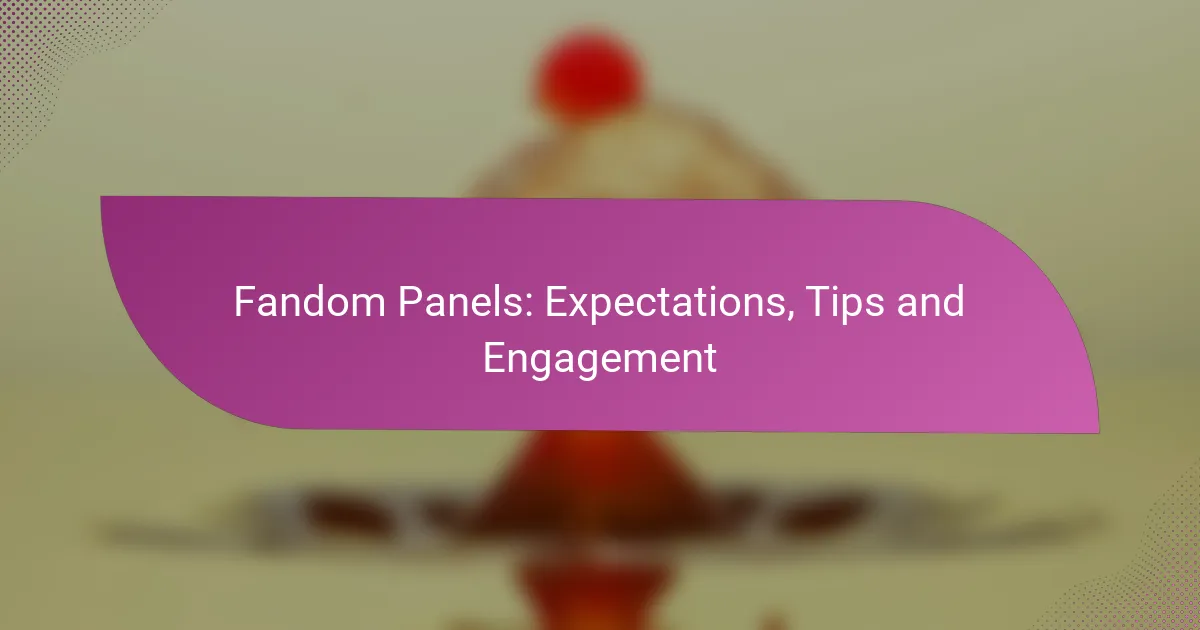Fandom panels offer a unique opportunity for fans to engage in organized discussions about their favorite topics within a community. By preparing thoroughly and employing effective communication strategies, panelists can create an interactive and memorable experience that resonates with attendees. Emphasizing audience participation and utilizing multimedia tools can further enhance the overall engagement during these events.

What Should You Expect from Fandom Panels?
Fandom panels are organized discussions at conventions or events that focus on specific interests within a fan community. Attendees can expect a mix of presentations, Q&A sessions, and interactive elements that cater to various levels of engagement.
Panel structure and format
Fandom panels typically follow a structured format that includes an introduction, main discussion, and audience interaction. Most panels last between 45 minutes to 1 hour, allowing time for presentations and questions. The moderator usually guides the discussion, ensuring that all panelists contribute and that the audience has opportunities to ask questions.
Common formats include roundtable discussions, where panelists share insights, and Q&A sessions, where audience members can directly engage with the speakers. Some panels may also incorporate multimedia elements, such as video clips or slides, to enhance the experience.
Types of fandom panels
Fandom panels can vary widely in focus, catering to different interests within a community. Some popular types include character analysis, world-building discussions, and industry panels featuring creators or actors. Each type offers unique insights and caters to specific audience interests.
For example, a character analysis panel might delve into the motivations and development of a beloved character, while an industry panel could provide behind-the-scenes insights from creators. These diverse formats allow fans to explore their passions in depth.
Audience engagement levels
Audience engagement during fandom panels can range from passive listening to active participation. Some panels encourage audience members to ask questions throughout the discussion, while others may reserve Q&A for the end. The level of engagement often depends on the panel’s structure and the moderator’s approach.
To maximize engagement, panelists can use interactive tools like live polls or social media hashtags, allowing attendees to contribute their thoughts in real-time. However, it’s essential for moderators to manage time effectively to ensure that all voices are heard without derailing the discussion.
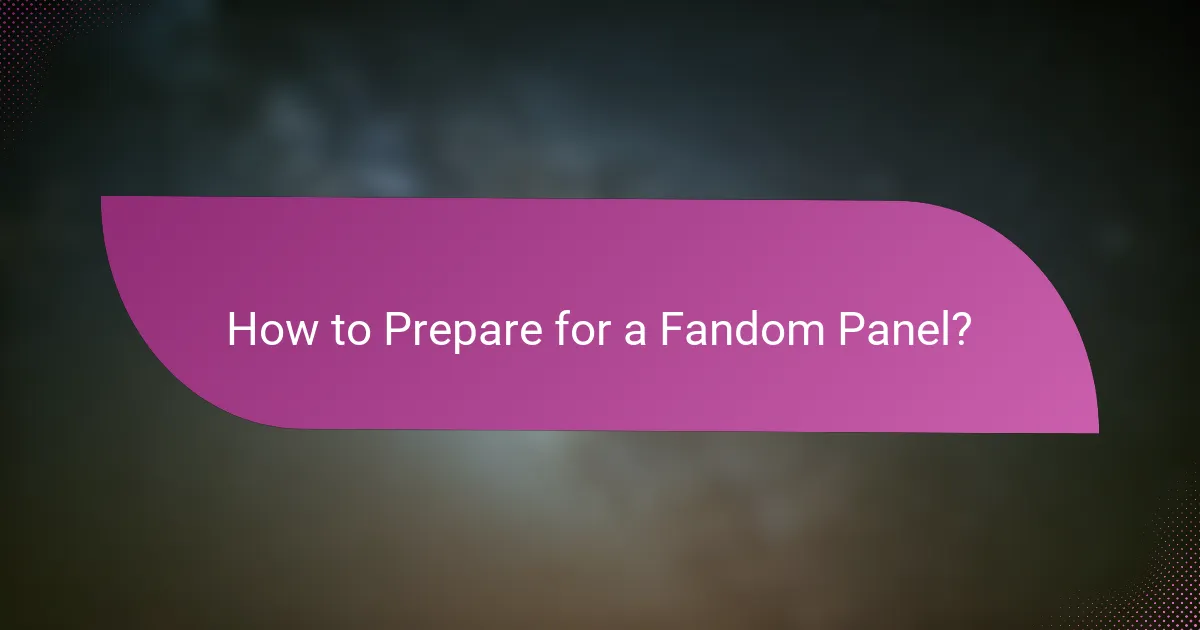
How to Prepare for a Fandom Panel?
Preparing for a fandom panel involves understanding the topic, honing your presentation skills, and organizing necessary materials. This preparation ensures a smooth and engaging experience for both the panelists and the audience.
Researching panel topics
Thorough research on the panel topics is crucial for delivering valuable insights. Start by exploring recent trends, fan theories, and community discussions related to the subject. Utilize online forums, social media groups, and fan sites to gather diverse perspectives.
Consider creating a list of key themes or questions that resonate with the audience. This can help structure your discussion and ensure you address the interests of attendees. Engaging with the community can also provide a sense of what topics are most relevant and exciting.
Practicing presentation skills
Practicing your presentation skills is essential for effective communication during the panel. Rehearse your content multiple times, focusing on clarity, pacing, and engagement techniques. Aim for a conversational tone to connect better with your audience.
Consider recording your practice sessions or presenting in front of friends for feedback. This can help identify areas for improvement, such as body language or vocal variety. Aim to keep your presentation within a reasonable time frame, typically around 30 to 60 minutes, to maintain audience interest.
Gathering necessary materials
Gathering necessary materials is a key step in preparing for a fandom panel. Ensure you have all visual aids, such as slides or props, ready and functioning. Check that any technology, like projectors or microphones, is compatible and tested before the event.
Additionally, prepare handouts or resources for the audience, if applicable. These could include summaries of key points, further reading suggestions, or contact information for follow-up discussions. Having these materials organized will enhance the overall experience for attendees.
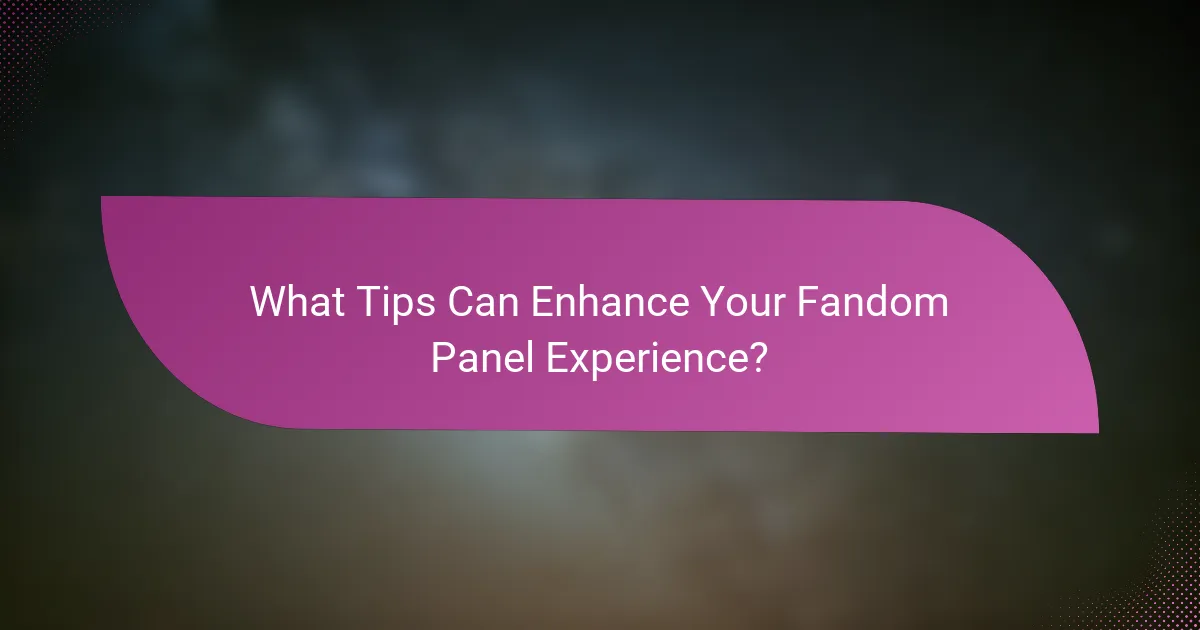
What Tips Can Enhance Your Fandom Panel Experience?
To enhance your fandom panel experience, focus on effective communication, utilize multimedia tools, and encourage audience participation. These strategies will create a more engaging and memorable event for both presenters and attendees.
Effective communication strategies
Clear and concise communication is key to a successful fandom panel. Start by outlining your main points and stick to them, ensuring that your message is easily understood. Use simple language and avoid jargon that may confuse the audience.
Practice active listening during the panel. Pay attention to audience reactions and adjust your delivery accordingly. This responsiveness fosters a connection and makes attendees feel valued.
Utilizing multimedia tools
Incorporating multimedia tools can significantly enhance your panel’s appeal. Use presentation software to display visuals, such as slides or videos, which can help illustrate your points and maintain audience interest. Aim for a balance of text and imagery to avoid overwhelming viewers.
Consider using live polls or Q&A platforms to engage the audience interactively. Tools like Slido or Mentimeter allow attendees to participate in real-time, making the experience more dynamic and inclusive.
Encouraging audience participation
Encouraging audience participation is vital for a lively fandom panel. Start by inviting questions early on and create an open atmosphere where attendees feel comfortable sharing their thoughts. Use prompts to spark discussions and invite specific audience members to share their insights.
Consider structuring parts of your panel around audience input, such as dedicating time for open discussions or feedback sessions. This not only enriches the conversation but also fosters a sense of community among fans.
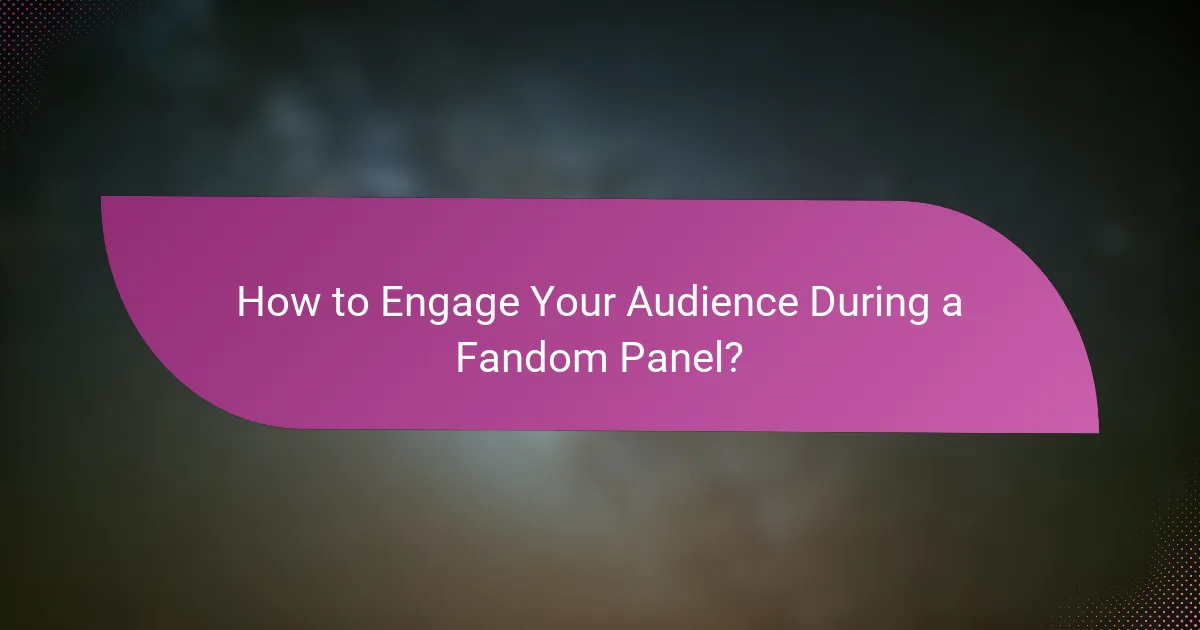
How to Engage Your Audience During a Fandom Panel?
Engaging your audience during a fandom panel involves creating an interactive experience that encourages participation and connection. Utilize various methods such as Q&A sessions, live polls, and incorporating fan stories to foster a lively atmosphere.
Interactive Q&A sessions
Interactive Q&A sessions allow the audience to ask questions directly, making them feel involved and valued. Prepare a few starter questions to kick off the conversation, but be ready to adapt based on audience interest.
Encourage attendees to submit questions through a chat feature or a designated app, especially in virtual settings. This approach can help manage the flow of questions and ensure everyone has a chance to participate.
Live polls and feedback
Live polls can gauge audience opinions on various topics, making them feel included in the discussion. Use simple tools like Poll Everywhere or Slido to create quick surveys that can be answered in real-time.
After presenting a question, share the results immediately to spark further conversation. This not only keeps the audience engaged but also provides valuable insights into their preferences and interests.
Incorporating fan stories
Incorporating fan stories into your panel can create a personal connection and enhance engagement. Invite fans to share their experiences related to the fandom, whether it’s a memorable event or a creative project.
Consider setting aside time for a few selected fans to share their stories live or through pre-recorded videos. This not only enriches the panel but also highlights the community aspect of the fandom.
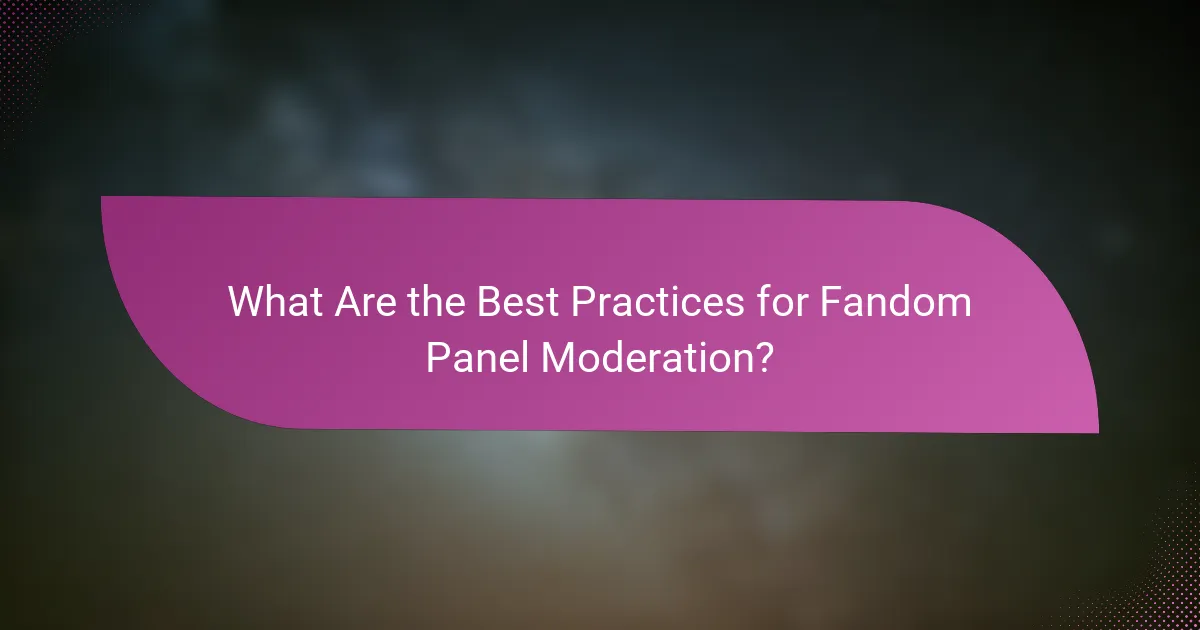
What Are the Best Practices for Fandom Panel Moderation?
Effective fandom panel moderation involves creating a welcoming environment, managing discussions, and ensuring that all voices are heard. By setting clear expectations and maintaining control, moderators can enhance the experience for both panelists and attendees.
Setting ground rules
Establishing ground rules at the beginning of a panel is crucial for fostering respectful dialogue. Clearly outline expectations regarding behavior, such as no interrupting and keeping comments relevant to the topic. This helps create a safe space for all participants.
Consider using a visible display or handout to reinforce these rules. For example, you might include guidelines like “one question at a time” or “no personal attacks.” This visual reminder can help attendees stay focused on constructive engagement.
Managing time effectively
Time management is essential for keeping a panel on track and ensuring all topics are covered. Allocate specific time slots for each segment of the discussion, including audience questions, and stick to these limits. A timer can be a helpful tool to signal transitions.
Encourage panelists to be concise in their responses. A good rule of thumb is to aim for answers that are no longer than two minutes, allowing for a more dynamic conversation and giving everyone a chance to contribute.
Handling difficult questions
When faced with challenging questions, remain calm and composed. Acknowledge the question’s validity and provide a thoughtful response, even if it requires redirecting the discussion. If a question is inappropriate or off-topic, politely steer the conversation back to the panel’s focus.
It may also be beneficial to prepare panelists for potential tough questions in advance. This preparation can include discussing strategies for addressing sensitive topics or agreeing on key messages to convey, ensuring a unified approach during the panel.
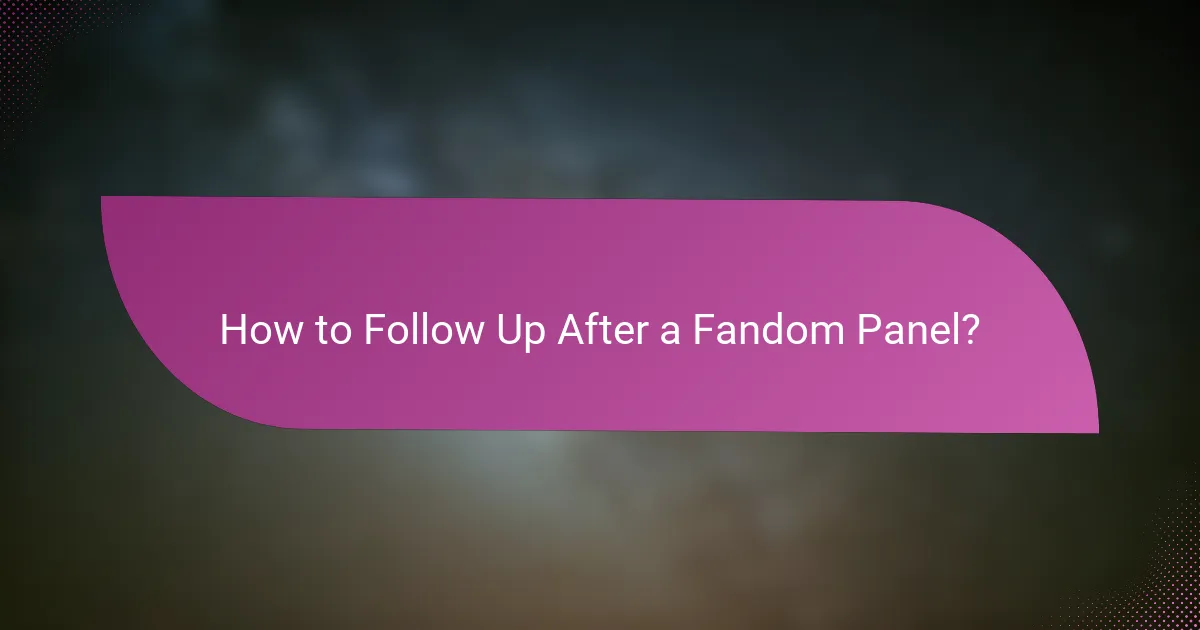
How to Follow Up After a Fandom Panel?
Following up after a fandom panel is essential for maintaining connections and deepening engagement. This can involve reaching out to panelists, sharing insights with fellow attendees, or participating in online discussions related to the panel’s topics.
Connect with Panelists
After a panel, consider reaching out to the panelists via social media or email. Express your appreciation for their insights and ask any lingering questions you may have. This not only shows your interest but can also lead to further discussions and networking opportunities.
When contacting panelists, keep your messages concise and respectful of their time. Mention specific points from the panel that resonated with you to create a personal connection.
Engage with Fellow Attendees
Engaging with fellow attendees can enhance your experience and foster community. Reach out to those you met during the panel or connect with others online through fandom forums or social media groups. Sharing thoughts and experiences can lead to deeper discussions and friendships.
Consider creating or joining a group chat or online forum dedicated to the fandom. This can be a great way to keep the conversation going and share resources or fan creations.
Share Your Thoughts Online
Sharing your thoughts about the panel on social media or fandom blogs can contribute to the community’s ongoing dialogue. Write a summary of your key takeaways or post your favorite quotes from the panelists. Tagging the panelists can also encourage them to engage with your post.
Use relevant hashtags to increase visibility and connect with others who attended the same panel. This can help you discover new perspectives and insights from fellow fans.
Participate in Follow-Up Events
Look out for follow-up events, such as Q&A sessions or virtual meet-ups, that may be organized after the panel. These events provide additional opportunities to engage with panelists and fellow fans, allowing for deeper discussions on the topics covered.
Check the official event website or social media channels for announcements about such events. Participating in these can help solidify your connections and expand your understanding of the fandom.
